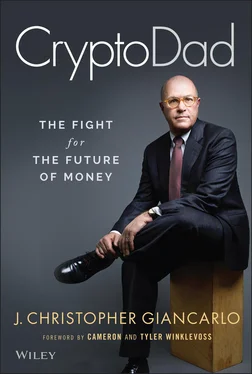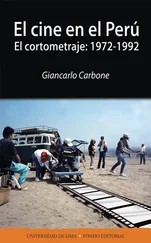In the first-ever, bipartisan, CFTC agriculture tour, Commissioner Wetjen and I flew to Iowa to visit the John Deere combine factory in Moline, the World Food Prize Foundation in Des Moines, and the corn and soybean fields just north of Clear Lake. (While there, we walked far out into a cornfield to pay homage at the site of the plane crash that killed rock ‘n’ roll pioneers Buddy Holly, Ritchie Valens, and J. P. “The Big Bopper” Richardson. 5 )
While these visits were delightful in their own right, they made me a better-informed regulator of American commodity futures markets. In corn fields and pole barns, I spoke directly with participants in CFTC regulated markets. These conversations gave me essential credibility back in Washington to address the impact of CFTC rules on the everyday people who depended on futures markets to hedge their production risks. They taught me that the number one concern of corn, soybeans, pork, and dairy producers is the fairness of the price they will get paid at harvest. That's what puts food on their tables.
I was not opposed to a position limits rule that would curb excessive speculation, especially by large financial traders. At the same time, it was essential that those limits not become so wooden or inflexible that they distorted the markets or harmed American agriculture or energy producers. That's what would happen if the rules interfered with those producers' ability to protect themselves against the vast declines in commodity prices that could occur—and were, in fact, occurring. If the prolonged collapse in commodity prices continued, and the position limits rule was not made workable, we would be burdening hedging activity at precisely the worst time.
My principal qualms regarding earlier position-limits proposals had been just that. I feared they would restrict bona fide hedging activity or harm America's farmers and energy producers. Both had been sorely affected by plummeting commodity prices and service provider consolidation. I was not willing to support a poorly designed rule that had to be continually tweaked through no-action letters and other ad hoc staff interpretations and advisories. That approach had become too common at the CFTC in prior years. We had to carefully consider the impact of any new proposal on America's almost 9,000 grain elevators, 2 million family farms, and 147 million electric utility customers. 6
The position limits proposals that I reviewed during my time as a minority commissioner were very detailed and complex, hundreds of pages in length, with thousands of footnotes. In too many cases, the proposals would have imposed additional paperwork, compliance costs, and burdens that would have done little to limit excessive speculation. I expressed my concern that they would likely result in higher costs for consumers of food and energy, which would be felt most heavily by low-income Americans.
I called for the CFTC to take better account of the costs and benefits of its rulemaking. This was especially urgent given the slow growth of the Obama economy and the administration's philosophy of attacking seemingly every issue with still more regulations. 7 The job participation rate—the percentage of Americans in the workforce—had not been this low in over 35 years. 8 During the Obama years, one in three Americans between the age of 18 and 31 were living with their parents. 9 And in one out of five American families, no one had a job. 10
Overregulation was not making things any easier. Under President Obama, business regulation cost the United States more than 12% of GDP or $2 trillion annually. 11 The average manufacturing firm spent almost $20,000 per employee per year on complying with federal regulations. 12 For manufacturers with fewer than 50 employees, the cost rose to nearly $35,000 per employee. 13 In a mediocre economy with many out of work and facing dwindling employment opportunities, we should not have saddled American consumers with higher prices for energy, food, and other commodities.
Also, in the aftermath of a period of expansionist rulemaking, it was imperative for the CFTC to base rulemaking on hard data. Far too often, CFTC rulemaking was built upon anecdote and supposition. To the extent the CFTC's 2013 position-limits proposal had been based on data at all, that data had been out of date, unreliable, and riddled with errors. I refused to support a new position-limits rule in the absence of better data justifying it.
In spring 2015, at a Texas energy markets conference at the esteemed Houston Club, I put it this way:
“Some people love to cite data when it supports their arguments. When it doesn't, they conveniently ignore it. In the case of position limits, there is an entire absence of any data based, quantitative foundation for the proposed regulations. This absence cannot be ignored. It draws into the question the entire efficacy and validity of the CFTC's proposed position limits regulations.”
What I didn't know at the time was that there may have been a reason the data was so poor. The CFTC's office of chief economist was evidently being blocked from producing the type of “data-based, quantitative foundation” required for any worthwhile regulatory proposal. This would come to light six months later, when a report of the CFTC's Inspector General revealed:
CFTC “economists identified position limits as an example of a topic on which economic research is no longer permitted … Several other economists confirmed their impression that [The Office of Chief Economist] is now censoring research topics that might conflict with the official positions of the CFTC … [The Inspector General] discussed this concern on multiple occasions with the current Chief Economist. He agreed that he had initially rejected a research proposal on position limits on the basis that it was politically controversial.” 14
Both publicly and privately, I denounced the flimsiness of the purported economic basis for the position limits proposal. I made clear to my colleagues and the staff that I would support a well-founded, well-crafted rule, but I would vigorously and vocally oppose a poorly conceived one not based on sound data.
In the summer of 2016, the CFTC released for public comment a supplement to its December 2013 position-limits proposal. It relaxed the procedures for persons seeking exemptions to pursue certain specific, bona fide hedging strategies. It also defined methods for recognizing trading strategies for which exemptions would be available.
I had encouraged and supported this supplement. While not the broad revamping of the position-limits proposal that I preferred, it was a solid step in the right direction. I believe it evidenced the thoughtful attention of Chairman Massad.
Later that year the staff put forward a proposal with still more improvements. It relied on up-to-date commodity and market data, was more practically designed, and would be less costly to comply with. I supported its publication for public notice and comment. This improved proposal came about at least in part, I believe, due to the pressure that I had exerted. My farm and oil patch visits had given me the credibility to insist that American farmers and energy producers not be allowed to become collateral damage of reforms meant to rein in Wall Street.
A few years later, I would direct the CFTC's work on a revised position-limits proposal. We were determined that the rule be responsive to public comments. We would not place regulatory barriers in the way of long-standing hedging practices used by American farmers, ranchers, producers, and manufacturers. While I was not able to present the proposal for a commission vote before I left the agency, my team did leave behind a working draft that served as a foundation for a quite good rule that was adopted by the commission six months after my departure. Progress made.
Читать дальше












